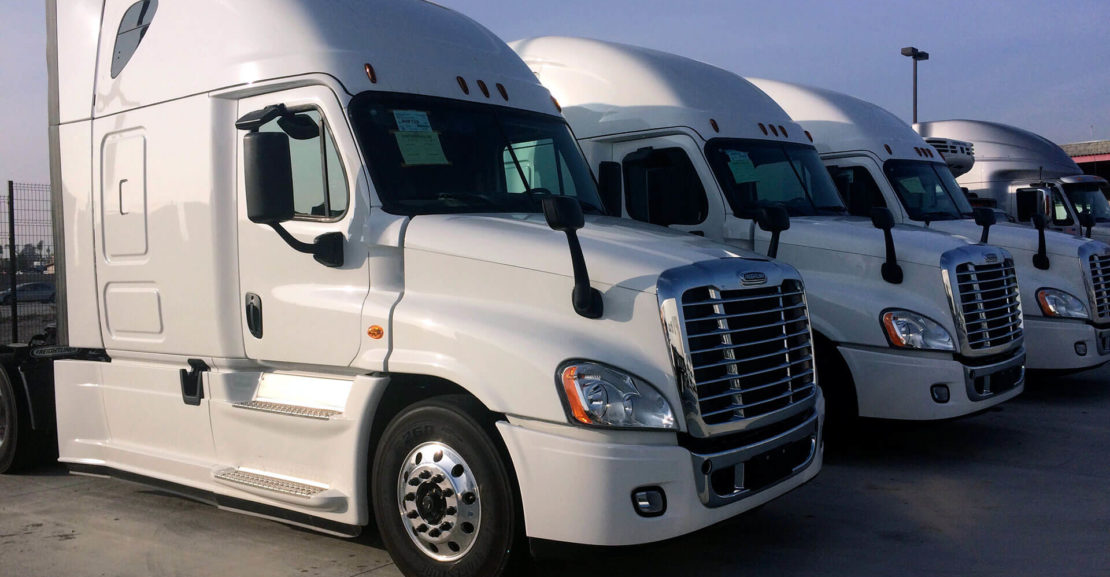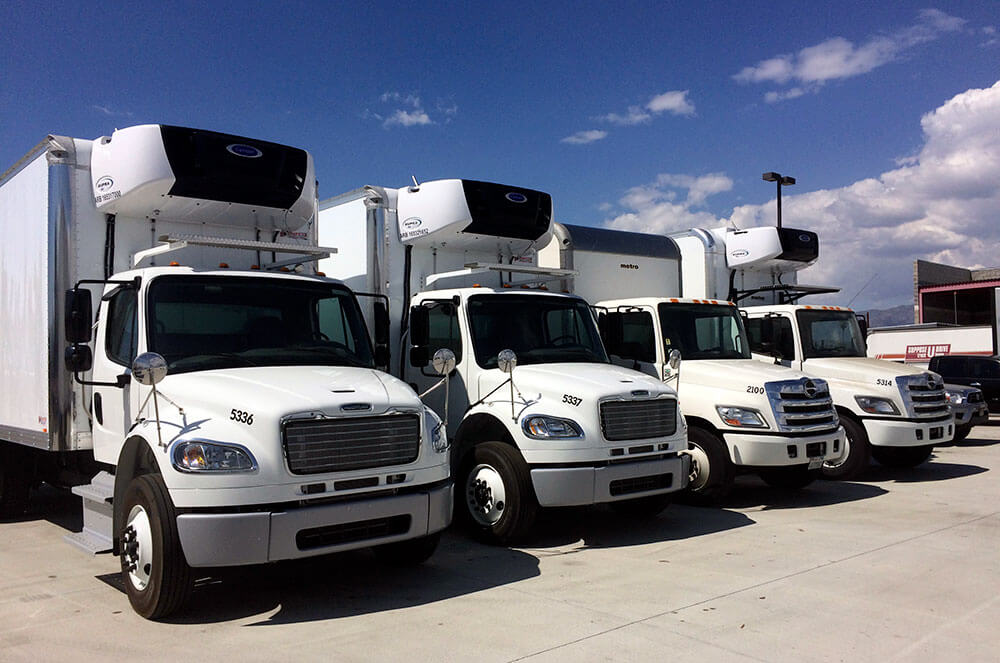Leasing vs. Renting Your Next Truck: Which is Best For You?

Need delivery trucks for your business? Leasing and renting are the two best options for supplying your business with the trucks needed to get deliveries done on time. Figuring out which path is best for your business isn’t as simple as it sounds. In fact, there are a lot of considerations to keep in mind, and of course, each approach has its pros and cons.
Rentals
By renting trucks, you are able to conserve capital. The rental company will maintain the unit, meaning you’ll save on upkeep. If it breaks down, they’ll fix it and get it back on the road or get you another truck. If you’re renting trucks, it’s usually for a short period of time. Renting is more expensive than leasing–but it presents very little risk to your company because of the short time commitment you have to that truck. It will save you money on upkeep and maintenance.
Key Benefits:
- Reduce your risk. Your company is not responsible for mechanical failures.
- Manage your costs wisely. Renting means you can return the equipment whenever you’re finished using it without worrying about re-selling or depreciation.
- Stay in compliance. Since the rental company is responsible for compliance with specific federal and local regulations, that’s one more worry off your company’s shoulders.
- Trade in or up whenever you need to. Again, your company doesn’t have to worry about re-selling. When you need another truck, just sign a new rental contract, do a walk around inspection, and you’re ready to make more deliveries.
Considerations:
- Renting should be seen as a short-term solution.
- Renting usually entails a higher rate than leasing.
- You are limited to the specifications of the rental truck
Leasing
Leasing a truck means you’re going to keep it for the long-term, usually 5 years on average. Leasing a truck is an excellent option since it typically requires no cash upfront and it means you won’t have to worry about returning it on a regular basis (as you would with rentals).
If you are leasing a truck, and something happens in your business where you don’t need the truck anymore, you are still responsible for buying out the remainder of the truck’s value or paying an early termination fee. This can be harmful to your company especially since having to return the equipment early likely means you’re already in a bad position financially.
Leasing also provides you with the opportunity to customize the truck to your business’ needs. Specific options include: engine and transmission type, body dimensions/material, lift-gate style, temperature control, aerodynamics, and more.
Key Benefits:
- Save money. When you lease, you don’t have to worry about the vehicle depreciating over time. In fact, this should be factored into the cost of your lease from the get-go.
- Be efficient. With a full-service lease, you don’t have to worry about maintenance costs or compliance issues, as the leasing company will assist you in these areas.
Considerations:
- Long-term commitments with buyout clauses or early termination fees may apply.
- Full-service leasing can save your company from upkeep and downtime.

Which is Better?
Determining which option is better for your company comes down to a few different factors:
1. How long are you going to need the truck?
Short-term: If you’re just getting started or if this is just a temporary replacement and you don’t foresee needing to use the truck for more than a few months, then renting would likely be the best option for your business.
Long-term: If you already have existing contracts in place or if you have a long history of steady business and you know you’re going to need the truck for more consecutive years, a lease would be the most cost-effective option.
2. Are you interested in purchasing?
Yes: Leasing companies offer a lease purchase option that lets you lease the truck for 5 years with the option to buy it at the end. They can apply a percentage of the lease payments towards the scheduled value, which will leave a remaining value that your company can buy the truck for at the end of the term.
No: If you are not interested in purchasing the truck, then the length of time you’re going to need it for should be the main determining factor in your decision.
Key Benefits:
- Owning a 5-year-old truck gives you temporary relief of payments.
Considerations:
- Maintenance and rental costs are exponentially higher when operating older equipment.
- Downtime and number of late deliveries goes up each time there is an issue with the truck.
Choosing To Rent
If you choose to rent your truck, the first step in the process is to locate a reliable rental company that carries the types of trucks you need. As a business, you will be able to rent all sorts of vehicles such as cargo vans, stakebeds, box trucks, refrigeration trucks, studio trucks, semi-tractors, and more… Most rental companies will have multiple vehicles on the lot for you to look over and choose from.
Here are some considerations and things to keep in mind:
- Does the rental company have your type of trucks readily available when needed?
- Are the trucks clean and working properly when picked up?
- How quickly can they get you on the road once you come in to pick up the truck?
- Are they thorough about documenting pre-existing damages on the rental truck?
- Does the rental company have varying rates per day, week, and month? What are they, and do they fit within your budget?
- Does the rental company have different lift-gate styles to choose from?
- Do they have specific insurance requirements to rent their trucks? Can the rental company provide short term insurance coverage?
- Ask how often (if required at all) you will need to bring the vehicle in for a service check. Make sure they accept responsibility for maintenance and repairs.
You should speak with the rental agent about all of your options while on the lot. For instance, you might be looking for a 24’ Box Truck with a Lift-gate that day while all they have available is a 24’ Stakebed or 24’ Refrigerated Truck with Lift-gate on the lot. If you explain what you’re carrying with the truck and how you’re loading/unloading the product then one of these other types of trucks might help you accomplish the same goal as your first choice.
While your case might not work out quite so conveniently as this example, if you are clear about what you are transporting, how you are loading/unloading the product, when you need it by, and where you are transporting the product to, the rental agent can make recommendations on which truck will work best and when you can pick it up!
Choosing To Lease
If you’ve determined that full service leasing is the best option for your company, you can begin doing research into which leasing company is the right fit for you. Here are some tips for choosing the right leasing company:
- Look for a company that’s been in business awhile and has a good reputation in the industry.
- Make sure the sales person takes the time to understand your business needs and processes before providing a lease solution.
- Leasing removes the hidden costs of buying such as: acquisition/disposal, administrative overhead, rentals, lost sales, lost customers, driver overtime, residual value risk,… Make sure the lease sales person includes this in the analysis when presenting a lease solution.
- Ask about buyouts and early termination fees.
As mentioned, your leasing sales person should factor in certain things (such as: amount of usage, miles driven, weight of product, number of stops) to determine the length of term and running costs. For example, transporting liquids will put much more strain on the trucks components hence a higher running cost than transporting foam. The lessor should factor this into the lease.

Final Considerations
Whether renting or leasing, there are some final considerations that go along with using trucks you don’t own, these include:
- What are the regulations regarding the truck and its usage? Are you responsible for this as a renter/lessee? Is the owner of the company responsible? This is an excellent question to bring up prior to signing any contract.
- Who is responsible for the truck if it breaks down while in use? Does the rental/leasing company cover the expense? Are you liable under certain situations? How quickly does the rental/leasing company respond to such incidents?
- How often do you need to bring it in for service? When does it need to be dropped off and when will it be ready? Does that interfere with your delivery schedule? Are there onsite maintenance options available? What about Pick-up and Drop-off services?
- Does the rental/leasing company provide substitute trucks when the lease truck breaks down? How readily available are those substitute trucks? Do they closely resemble the lease truck’s specifications?
- Do you and/or the drivers need a Commercial Drivers License (CDL) to operate the vehicle? What are the advantages of using CDL truck vs. a Non
Still unsure which option is best for you? Let us walk you through the pros and cons of both truck leasing and truck renting.
Speak to an expert today. Call (213)-214-3623

